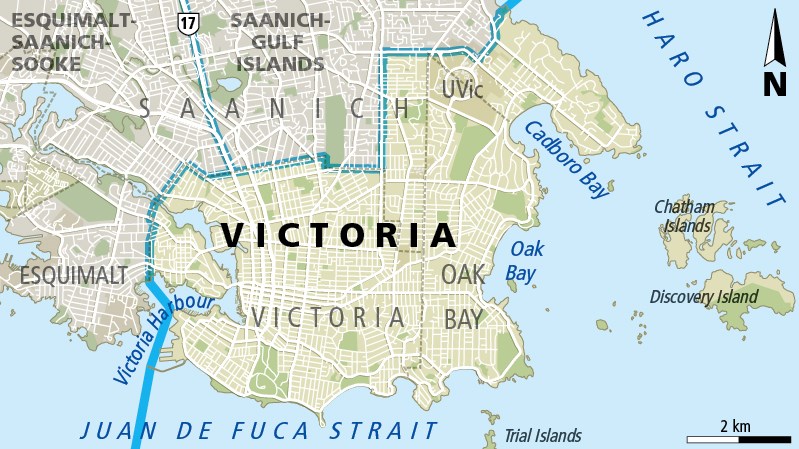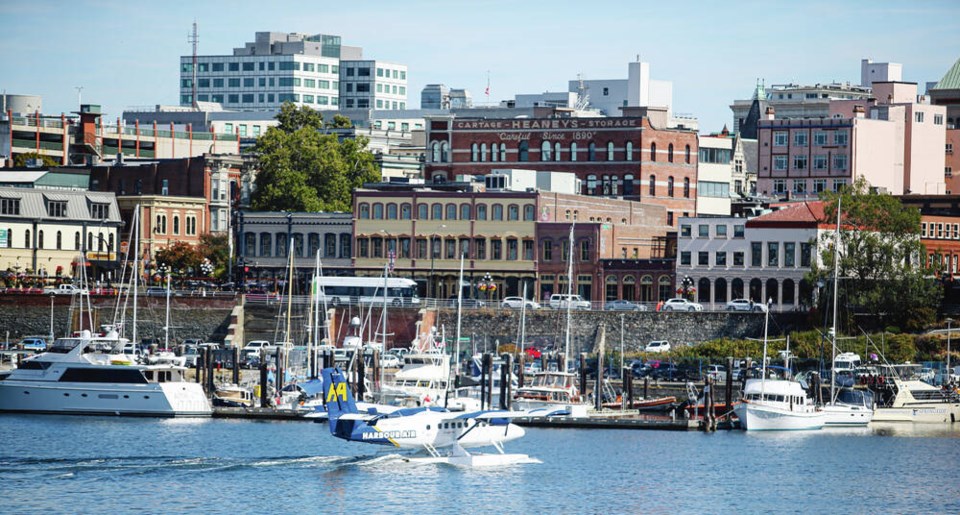Jack Knox is travelling around Vancouver Island’s seven federal ridings, looking at them through the lens of issues readers say are important in this election.
Victoria has long been one of the greenest — that’s with a small “g” — ridings in the greenest part of the country.
The connections to the natural world, the forests, the oceans, run deep. It’s why people are drawn here. Nobody comes for the ferry fares and wild nightlife.
The evidence is at the ballot box. The previous member of Parliament, New Democrat Murray Rankin, taught and practised environmental law before being elected. Prior to the NDP winning the seat in 2006, it was held for 13 years by Liberal David Anderson, the federal environment minister whose green pedigree goes back half a century to when he was fighting to keep oil tankers off the coast.
Layered on that environmental ethos, this year has seen intensified worry about climate change, no longer seen as just the slow leak in the plumbing that we had better fix before it gets serious. National polls show it’s a top concern for voters. Ditto for Times Colonist readers when they were asked what mattered to them.
It’s not the only big issue in this riding, of course. Housing affordability is as contentious here as it is throughout the region, though not necessarily in the same ways: In Victoria proper, renters comprise 61 per cent of households, compared to 34 per cent in the region as a whole. Homelessness dominates political agendas (note that two weeks before the election call, Ottawa promised $11.3 million to build 46 social-housing units in the region, on top of $13.1 million for 91 units announced earlier).
Still, the interest in climate is reflected in the current crop of local candidates. The incumbent MP, Laurel Collins, is the New Democrat climate change and environment critic.
Her Liberal challenger, Nikki Macdonald, is billed as an oceans and climate expert. The Conservative lists the environment as a priority. And climate is, of course, the signature issue of the Greens.
The NDP have won this seat in six successive elections and byelections, but their margin of victory dipped last time. In 2019, Collins, who at the time was a Victoria councillor, won with 33 per cent of the vote, just three per cent ahead of Green candidate Racelle Kooy, a virtual unknown. The Greens felt they would have captured the seat had their 2015 candidate, former CBC Radio host Jo-Ann Roberts, been in the race.
The Greens are running another little-known candidate this time, 23-year-old UVic law student Nick Houghton. Also without much name recognition is the Conservative, Hannah Hodson, who faces the twin hurdles of entering the race late (she wasn’t nominated until Aug. 26) and living not in Victoria but in Ottawa, where she is the assistant to Conservative MP Dan Albas.
The Liberals are high on Macdonald and her background in science and politics (she was an advisor to Jean Chretien). She got a boost from an unexpected source last week when former B.C. Green Party leader Andrew Weaver, whose name was synonymous with climate research long before he went into politics, gave his blessing to both Macdonald and the Liberal climate plan. Weaver called it “the only credible, science-aligned plan put forward by any party.” He pointed to measures involving carbon pricing, permanent funding for public transit, a shift to zero-emission vehicles and the phasing-out of coal by 2030.
Macdonald would have a lot of ground to make up, though: she polled just 22 per cent in the 2019 election. And it’s not like Justin Trudeau has had the campaign he expected when he called the election.
Also, while the Liberal plan might have won Weaver’s approval, federal Green icon Elizabeth May detects a lack of urgency from all the traditional parties in what she has called “a climate-crisis, climate-emergency election.” She charges NDP leader Jagmeet Singh with being weak on the climate file, ducking and dodging when asked whether he would cancel the Trans Mountain pipeline project.
So, what do the parties propose to do about climate change?
• Liberals: Plan to cut greenhouse gas emissions to at least 40 per cent below 2005 levels by 2030. The previous goal was 30 per cent. Measures would include pushing the national carbon price, currently $40 a tonne, to $170 a tonne by 2030, returning the money to taxpayers through rebates. At least half of all new cars sold by that year would have to be zero emission. There would be a series of rolling emission-reduction targets for the oil and gas sector.
• Conservatives: Plan to revert to the old 30 per cent gas-reduction target. They have swung away from their opposition to a carbon tax, but want to cap it at $50 a tonne. They want a system in which consumers would pay when buying gas or similar fuels, but then recoup that money through a personal low-carbon savings account that they could draw on when buying items such as bikes or more efficient furnaces. Thirty per cent of new cars sold in 2030 would be zero-emission.
• NDP: Set up a climate-emergency cabinet committee with a goal of reducing emissions by 50 per cent by 2030. Eliminate support for fossil-fuel companies and require big industrial emitters to pay more. Double funding to $4.4 billion to make public transit fully electric.
• Greens: Cut emissions by 60 per cent. Ditch the Trans Mountain pipeline. Phase out extraction of fossil fuels. Raise carbon tax by $25 a tonne annually until 2030. Ban the sale of internal combustion passenger vehicles by 2030.
Tilting totally in the opposite direction is the People’s Party of Canada, which does not accept human-caused climate change and wants to abandon what it calls unrealistic greenhouse-gas-reduction targets. “Given the uncertainties over the scientific basis of global warming, and the certainties about the huge costs of measures designed to fight it, there is no compelling reason to jeopardize our prosperity with more government interventions,” the party says.
The PPC’s Victoria candidate is John Randal Phipps, whose website speaks of opposing vaccine passports and the growth of tyrannical forces within government. Also on the ballot are Janis Zroback for the Communists and Jordan Reichert, running once again for the Animal Protection Party.
A noteworthy addition is Hodson, a transgender woman whose entry in the race challenges the stereotype of a Conservative candidate. These are not “your grandfather’s Conservatives,” says Hodson, whose years in the provincial government included time as communications co-ordinator for former premier Christy Clark.
There will be more on the candidates in Thursday’s edition.
jknox@timescolonist.com

THE RIDING
The smallest riding on Vancouver Island, it includes Victoria, Oak Bay and part of Saanich.
• Size:43 square kilometres
• Population: 117,133
• Registered voters: 98,712
• In the past: City councillor Laurel Collins replaced retiring fellow New Democrat MP Murray Rankin in 2019, receiving 33 per cent of the vote. The Green Party’s Racelle Kooy had 32 per cent. They were followed by Liberal Nikki Macdonald, who is running again, with 22 per cent. The Conservative had 13.
THE CANDIDATES
• Laurel Collins, NDP
First-term MP is the incumbent.
Website: Laurelcollins.ndp.ca
Twitter: @Laurel_BC
Facebook @CollinsLaurel
Instagram: laurelndp
• Nikki Macdonald, Liberals
Oceans and climate researcher also ran in 2019
Website: nikkimacdonald. liberal.ca
Twitter: @OceanNikki
Facebook: @nikki4victoria
• Nick Loughton, Green Party
Greens — UVic law student
Website: greenparty.ca
Twitter: @nloughton
Facebook @nickloughtongreen
• Hannah Hodson, Conservative
Assistant to Conservative MP in Ottawa
Website: conservative.ca
• John Randal Phipps, People’s Party of Canada
entrepreneur
Website: johnrandalphipps@ wordpress.com
Twitter: @Killsixfinger
• Jordan Reichert, Animal Protection Party
Has run as an animal rights advocate at the federal, provincial and municipal levels
jordanreichert.ca
• Janis Zroback, Communist
Website: votecommunist.ca



